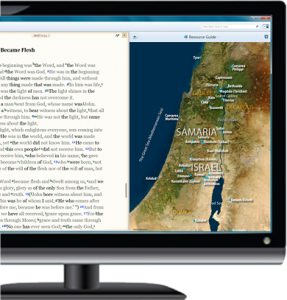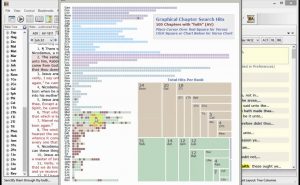
Shownotes
Welcome to Day 1625 of our Wisdom-Trek, and thank you for joining me.
This is Guthrie Chamberlain, Your Guide to Wisdom
Bible Study – Software and Reference Works – Meditation Monday
Welcome to Wisdom-Trek with Gramps! Wisdom is the final frontier in gaining true knowledge. Our mission is to create a legacy of wisdom, seek out discernment and insights, and boldly grow where few have chosen to grow before. Hello, my friend; this is Gramps; thanks for coming along on our journey to increase Wisdom and Create a Living Legacy Today is Day 1625 of our Trek, and it is time for Meditation Monday. Taking time to relax, refocus, and reprioritize our lives is crucial in order to create a living legacy. For you, it may just be time alone for quiet reflection. You may utilize structured meditation practices. In my life, Meditation includes reading and reflecting on God’s Word and in prayer. It is a time to renew my mind, refocus on what is most important, and making sure that I am nurturing my soul, mind, and body. As you come along with me on our trek each Meditation Monday, it is my hope and prayer that you, too, will experience a time for reflection and renewing of your mind.
Today will be the final two insights on Meditation Monday as we focus on Mastering Bible Study from Hebrew Scholar, Dr. Michael S. Heiser. We will finish up insights which are focusing on practical tools for Bible study. Today let us meditate on:
Bible Study – Software and Reference Works
· Insight Seventy-Nine: Bible Software Should Be a Tool for Bible Study, Not a Crutch
You know by now how I feel about Bible software. It’s an essential tool for Bible study. If you can navigate Facebook or check email, you can use Bible software. It’s time to rush boldly into the twenty-first century.
Think about it. We use technology for almost everything. If you’re an adult, a lot of that technology is recent. That means there was a time you didn’t have it and used something else. That, in turn, means you were able to learn it and take advantage of the benefits. If you can take pictures of yourself doing embarrassing, pointless things and upload them for millions of people you don’t know to see, then you can learn how to use Bible software.
The only real trick to Bible software is discovering what you can do with it. That works two ways. Bible software can replicate what you currently do with amazing speed and visual clarity. In other words, it can help you with all the strategies you enjoy now. But Bible software can also help you get to the information in ways you’ve never imagined. Old dogs can learn new tricks.
Logos Bible Software is my tool of choice. Not only does it help me with original language research, but it’s a library. I’ve already talked about original language tools and software. I want to focus on the library here.

We know what libraries and books are. But having a digital library in a software platform is like also having a research assistant. With one click, you can run through thousands of volumes for a topic. Yesterday’s Bible study meant flipping a book open to see if it had an index that included the topic word you’re looking for. But what if the book doesn’t have an index? In a software environment, that isn’t an issue. Your research assistant has all your books memorized. The result is discovering help you didn’t know was available.
The danger with having supercharged tools is that they become a crutch. That can happen. People will encounter the temptation to copy and paste what they find into their Bible study notes without analyzing the information. You pile on information without assessing the content. It’s like buying books that you never read. Remember: there is no substitute for thinking when it comes to Bible study—not even software.
· Insight Eighty: When Studying Biblical Words, Pay Attention to Word Distribution

Recommending that a Bible student become familiar with Bible reference works is like suggesting to a carpenter that he get familiar with a hammer, saw, and drill. Reference works are crucial tools for any serious Bible study. I want to acquaint you with the different types of reference works for Bible study in this insight.
There are several things to look for in any given reference work.
First, you want it to be the product of specialists. Most major academic publishers keep a sharp eye on this sort of thing because their reference works won’t sell to libraries, the biggest buyer of reference material, without such expertise. That means you can avoid substandard work by ensuring the publisher has a long track record of producing reference material.
Second, you want it to be up-to-date. The typical life cycle of reference work in biblical studies is twenty years. Time marches on. In the span of a few decades, archaeologists, historians, linguists, and biblical studies scholars discover new things and new ways of analyzing the Bible. For instance, a biblical reference work produced in the year before the Dead Sea Scrolls were discovered became out-of-date long before the twenty-year cycle!
More specifically, there are different types of reference works. Most people hear the phrase reference work and think of encyclopedias. That’s undoubtedly a significant category. Encyclopedias relevant to biblical studies might be devoted to the Bible itself. Still, the ancient Near East or ancient Greece and Rome’s encyclopedias are also crucial for serious Bible study.
Not all reference works are encyclopedias. Bible dictionaries are similar but not quite the same thing. There are exceptions, but Bible dictionaries are usually shorter and therefore not as exhaustive. They are most often one-volume works, while encyclopedias tend to be multivolume sets.
Bible atlases are reference works. Every Bible student should have a good Bible atlas, which is filled with maps and some discussion about places and incidents marked on the maps.
Related to reference works specifically about the Bible are theological reference works. There are many specialized dictionaries aimed at theological topics.
There are other types of references, but these are the major categories.
Study this Book of Instruction continually. Meditate on it day and night so you will be sure to obey everything written in it. Only then will you prosper and succeed in all you do.
That is a wrap for today’s Meditation. Next Monday, we will switch to a daily nugget of wisdom as we learn from short but crucial lessons. Thank you for joining me on this trek called life. Encourage your friends and family to join us and then come along tomorrow for another day of ‘Wisdom-Trek, Creating a Legacy.’

If you would like to listen to any of the past 1624 daily treks or read the daily Journal, they are available at Wisdom-Trek.com. I encourage you to subscribe to Wisdom-Trek on your favorite podcast player so that each day will be downloaded to you automatically.
Thank you for allowing me to be your guide, mentor, and most importantly, I am your friend as I serve you through this Wisdom-Trek podcast and Journal.
As we take this Trek of life together, let us always:
- Live Abundantly (Fully)
- Love Unconditionally
- Listen Intentionally
- Learn Continuously
- Lend to others Generously
- Lead with Integrity
- Leave a Living Legacy Each Day
I am Guthrie Chamberlain….reminding you to ’Keep Moving Forward,’ ‘Enjoy your Journey,’ and ‘Create a Great Day…Everyday’! See you tomorrow for more daily wisdom!